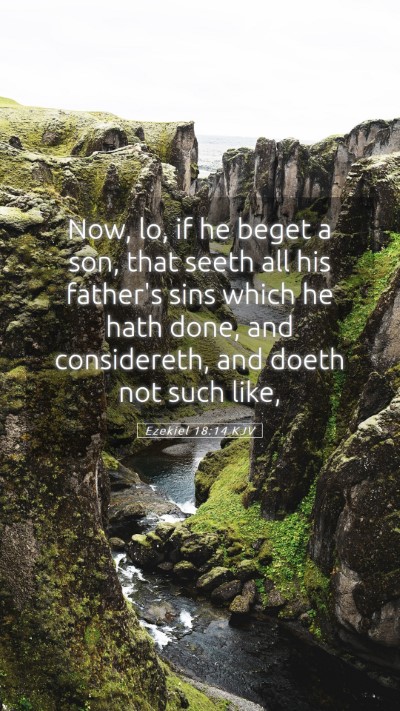Bible Verse Meaning of Ezekiel 18:14
Ezekiel 18:14 states, "Now, lo, if he beget a son, that seeth all his father's sins which he hath done, and considereth, and doeth not such like." This verse explores themes of personal responsibility, the consequences of sin, and the potential for change. In this analysis, we will delve into various commentaries to understand its meaning more fully.
Overview of the Verse
Ezekiel 18:14 is part of a larger discourse where God emphasizes that individuals are accountable for their own actions. This passage specifically highlights a son who, despite witnessing his father's sinful behavior, chooses not to emulate it. This choice reflects the core biblical principle that each person is responsible for their own life before God.
Commentary Insights
-
Matthew Henry's Commentary
Henry explains that this verse illustrates the important distinction between inherited guilt and personal accountability. The son learns from the mistakes of his father and exercises wisdom by rejecting a sinful lifestyle. He emphasizes the capacity for individual choice in the face of familial influences.
-
Albert Barnes' Commentary
Barnes notes that Ezekiel stresses the importance of the son's discernment in observing his father's actions. He highlights that observing sin should lead to reflection and a firm resolve to avoid such behaviors. This aligns with the broader theme of repentance and the ability to break free from a cycle of sin.
-
Adam Clarke's Commentary
Clarke expounds that the verse illustrates the mercy of God in allowing individuals the opportunity to choose righteousness. He points out that, regardless of parental legacy, the son can develop a personal relationship with God founded on moral choices rather than inherited sin.
Key Themes
- Personal Responsibility: The verse underscores that each individual is accountable for their own actions, a central tenet of biblical teaching.
- Choice and Consequence: The son’s rejection of his father’s sins exemplifies the ability to make choices that lead to different life outcomes.
- Influence of Family: The verse acknowledges the impact of familial behavior while illustrating that one can choose a different path.
- God’s Justice and Mercy: It reflects the fairness of God's judgment, where each person is judged based on their own deeds, not merely their heritage.
Application of the Verse
In applying Ezekiel 18:14 to daily life, one can reflect on the importance of making conscious choices that align with one's values, regardless of external influences. This verse encourages believers to learn from the mistakes of others and to forge their own path through resolute decision-making.
Cross References
- Deuteronomy 24:16: "Fathers shall not be put to death for their children, neither shall children be put to death for their fathers: every man shall be put to death for his own sin."
- Galatians 6:5: "For every man shall bear his own burden."
- Romans 14:12: "So then every one of us shall give account of himself to God."
Conclusion
The insights provided by various commentaries enrich our understanding of Ezekiel 18:14. The verse serves as a powerful reminder that we hold the keys to our destiny through the choices we make. In Bible study groups or personal reflection, consider how this verse speaks to the significance of choice and accountability in your own life. Whether through online Bible study or utilizing Bible study tools and guides, delve deeper into the meanings of scripture as you explore themes present in verses like Ezekiel 18:14.


